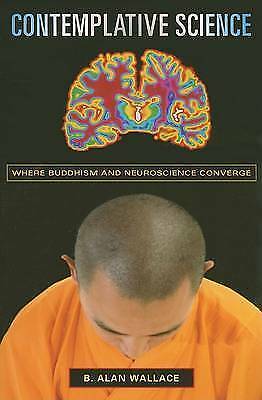Book Extract: Contemplative Science:
Where Buddhism and Neuroscience Converge by B. Alan Wallace
In this extract Alan Wallace explores the question, why Western science is disposed against a science of introspective investigation. This lack, he argues, means that complementary epistemologies are not open for examination.

Book Cover
Wilson, as seen previously, expresses the view of many scientists when he asserts that outside our heads is an independent, objective world, and inside our heads is a reconstitution of reality based on sensory input and the self-assembly of concepts. The proper task of scientists he claims , is to correctly align our inner representations of reality with the world outside. The problem here, which he acknowledges, is that scientists have no body of external, objective truth by which the alignment of scientific theories and the world outside can be calibrated. In other words, the empirical data that we perceive, together with the scientific theories that account for them, all consist of mental representations; and we have no objective yardstick with which to compare them with what we assume to be the “real world.”
How are we to get out of this conundrum? Wilson suggests that criteria of objective truth might be attainable through empirical investigation. The key lies in clarifying the still poorly understood operations composing the mind and in improving the piecemeal approach science has taken to its material properties. He assumes that the mind is actually composed of brain processes, but as I have already pointed out, this is still an unproven hypothesis, not a scientifically established fact. Given how little scientists presently understand about the relation between the mind and the brain, it would be far more objective to regard it as a topic to be researched with an open mind, rather than assuming (or demanding) that science will one day confirm current materialistic beliefs.
If we maintain this materialistic bias, no empirical science of consciousness is likely to emerge in the foreseeable future. Rather, if the cognitive sciences continue to be constrained by the assumptions of scientific materialism, consciousness will be reduced to something that can be explored and understood within the parameters of that ideology, as various researchers, such as Francis Crick and Christof Koch, are already attempting to do. Just as kinematics (the phenomenological study of matter in motion) logically precedes mechanics in the study of physics, the rigorous, firsthand investigation of consciousness logically precedes any formulation of the mechanisms that account for the emergence of consciousness.
Modern science has never developed a rigorous introspective methodology for observing the phenomena of consciousness mental processes and states. William James, the foremost pioneer of American psychology, recognized the importance of studying behavioural and neural correlates to mental processes, but he emphasized the primary role of introspection in this endeavour. However, insofar as the mind is prone to alternating agitation and dullness, it is an unreliable instrument for observing anything. To transform it into a suitable instrument for scientific exploration, the stability and vividness of the attention must be developed to a high degree. James was well aware of the importance of developing such sustained voluntary attention, but he acknowledged that he did not know how to achieve this task.
To sum up, the modern West has developed a sophisticated science of behavioral and neural correlates of consciousness, but no science of consciousness itself, for it has failed to develop sophisticated, rigorous means of exploring the mental phenomena firsthand. And that is the first step toward developing an empirical science of any class of natural phenomena. Thus, with regard to exploring the nature, origins, and potentials of consciousness, cognitive scientists and neuroscientists are more like astrologers, who carefully examine correlates between celestial and terrestrial phenomena, than astronomers, who carefully examine celestial phenomena themselves.
A second result of the historical development of Western science is an elaborate science of mental illness, but no science of mental health. Indeed, there is hardly any scientific consensus on the criteria by which to identify mental health. Nor is there any Western science that shows how to cultivate extraordinary mental health or genuine happiness. The Greek and Christian theories of eudaimonia, the human good and a “truth-given joy,” have been forgotten in modern science, and the very existence of a truth that yields such well-being has no place in the scientific view of human existence or the universe at large.
In short, the West presently has no pure science of consciousness that reveals the nature, origins and potentials of this natural phenomenon, and it similarly lacks an applied science of consciousness that reveals means for refining and enhancing consciousness and thereby achieving eudaimonia. But this does not necessarily imply that all other human civilizations throughout history have been equally deficient.
(Contemplative Science: Where Buddhism and Neuroscience Converge by B. Alan Wallace, pub. Columbia University Press 2009)
.....................................
In this YouTube talk B. Alan Wallace takes a brief look at the history of Western science and how it developed a 'naturalistic' view of the world that ended up marginalising and eventually excluding subjectivity.
The Buddhist Science of Mind.




